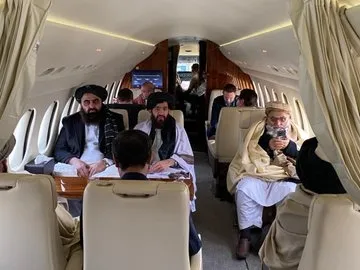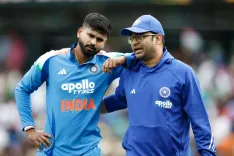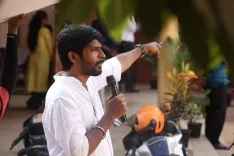Are Senior Taliban Ministers Strengthening Ties with India?

Synopsis
Key Takeaways
- Taliban ministers' visit highlights improving ties with India.
- Focus on critical discussions amidst regional tensions.
- Humanitarian aid continues despite lack of formal recognition.
- Potential visit by Foreign Minister Muttaqi could be a turning point.
- Geopolitical shifts may redefine India's role in the region.
New Delhi, Sep 12 (NationPress) Highlighting the ongoing enhancement of relations between India and the dominant faction in Kabul, two senior ministers from the Taliban recently arrived in New Delhi, as confirmed by well-placed sources to IANS on Friday.
Sources disclosed that Afghanistan’s Deputy Minister of Medicine and Food, Hamdullah Zahid, visited the Indian capital last week to participate in the 11th International Exhibition on Pharmaceuticals and Healthcare (iPHEX 2025).
Zahid, who came with a delegation of officials, engaged in discussions with the Indian Chamber of Commerce and FICCI before quietly departing two days ago.
Additionally, sources informed IANS that another high-ranking Taliban official involved in security and strategic matters is currently in New Delhi, actively engaging in talks with Indian officials on crucial subjects.
This senior figure, whose name remains confidential for now, is among the top brass of the Taliban leadership. Notably, this visit coincides with heightened tensions along the Durand Line, with growing strains between Afghanistan and Pakistan. Islamabad has accused Kabul of harboring Tehreek-e-Taliban Pakistan (TTP) militants and has conducted cross-border airstrikes, which have drawn sharp rebukes from Taliban leaders.
Recent reports from Pakistani media indicate the movement of around 8,000 to 10,000 TTP fighters from Afghanistan into Pakistan, creating alarm within Islamabad’s already vulnerable security framework, which is dealing with simultaneous insurgencies from both TTP and Baloch groups.
The arrival of the two ministers in New Delhi follows closely on the heels of IANS reporting that Afghan Foreign Minister Amir Khan Muttaqi had unexpectedly canceled his planned visit to India.
While India has not yet formally recognized the Taliban regime, it has taken steps such as reopening its Embassy in Kabul and providing ongoing humanitarian assistance, particularly after the devastating earthquake last month. New Delhi continues to engage regularly with the Taliban administration.
It is noteworthy that Afghan consulates in Mumbai and Hyderabad have already been transferred to diplomats appointed by the Taliban.
Sources suggest that the New Delhi mission could be next, signaling a significant shift in India’s diplomatic approach.
“Delhi is engaging with the Taliban regime and is likely to bolster this engagement further, taking into account the regional dynamics and national interests,” remarked a senior Afghan leader to IANS.
Another unnamed Taliban leader stated, “Our relationship with India is evolving, albeit slowly. However, it appears that our Foreign Minister Amir Khan Muttaqi is set to visit Delhi by the end of this year, which would mark a significant milestone in our bilateral ties.”
Experts believe that the consecutive visits of Taliban ministers to Delhi signify a new geopolitical shift in the region, with India emerging as a subtle yet influential player.









